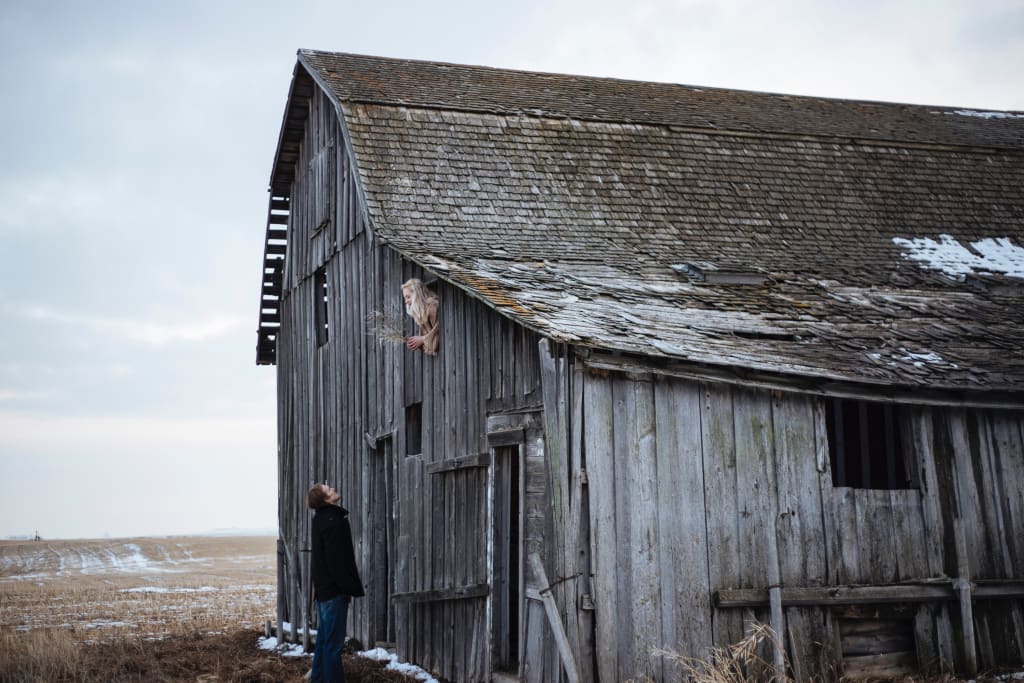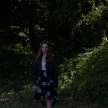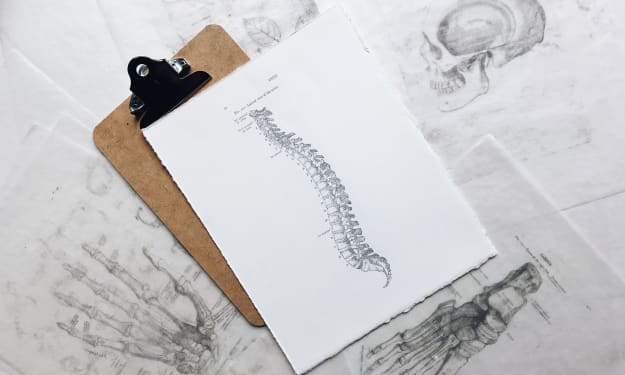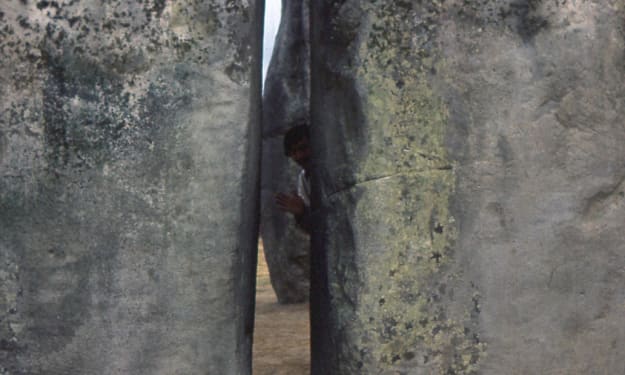Ascension
A bloodstained death cult moves on without their prodigal daughter.

I knew blood from the moment I was born. Blood from my skinned knees: too spindly, too weak. Blood from the nettles in the field, the leeches in the creek, the baby teeth I lost in the dirt. Blood from the first mallard I killed with my father’s shotgun. Blood from that same father’s fists.
After a while I was not afraid of it. It was merely there, an unwelcome house guest. It trailed after me, from childhood altar calls to screaming, sweating childbirth on the hardwood floor of our home.
*
Through my adolescent years, and into my twenties, I dreamed the same dream, its colors muted and dull but for the bright poppy-red blood. Even now, far removed from the setting and the people in the backdrop, I still have the dream.
I’m lying on my back, feet in clinical stirrups, cold against my ankle bones. I’m in a hospital bed and the surroundings are white, so white. So clinical. My long hair is damp and tangled, the swell of my heaving stomach covered for purposes of modesty. I feel the pain as strongly as if it were real, the baby’s head crowning, my pelvic muscles straining, my vision going back with each contraction. It’s a kind of paralysis.
Suddenly the scene changes, the white lights blinding me, and I cry out thinking I’ve gone and died and failed, leaving my child motherless. The women around me—there are no medical staff, no doctors—vanish like ghosts, shaking their heads with disapproval.
Coolly, everything changes again. A fade-in like a poorly budgeted film, though we never watched movies with such sinister themes. I’m in the same hospital bed, feeling the same labor pains. But I’m no longer in the hospital. My surroundings are now puritanical. As I glance down, I notice I am in a prairie dress, tepid tea-stained yellowish fabric, and it’s stained with blood. The walls around me are wooden. I’m in my parents’ barn.
I flash forward, skipping in time like a record. I hear the wail of the baby, thinking it strange that it had ripped me open and left no feeling. I am numb from the waist down, but the hem of my pilgrim’s dress is soaked crimson.
I always awaken at this point, having glanced around to see that I am alone, hemorrhaging with my child with no one around to help. I wake with a ringing in my ears and the taste of vomit in my mouth, trembling.
I grab my leather journal, scribble down the date and time and remind myself to tell Dr. Haywood. I rest my head back down on my satin pillowcase, beginning the grounding mantra I have learned. Five things you can see. Four things you can touch. Three things you can hear.
It still feels wrong to engage in such a practice. I’m still half-certain that the devil is behind the curtain, in my closet amongst my faded dresses and shoeboxes full of old homeschool curriculum.
*
The day after I bled for the first time my mother beamed and my sisters all hugged me. They gave me chalky white pills that were difficult to swallow and rejoiced at the new season of life I had entered.
My father remained aloof and serious that day in his office. Later that night, I was studying in the kitchen light when he approached me in his church clothes. He placed a gentle hand on my shoulder, rubbed circles on the bony jutting clavicles there. My dad had let his facial hair come in, because it was Friday night, and sometimes he broke the rules. I blinked at him for a moment before I recognized him.
I knew what was coming. He had taken Leah and Rebecca by themselves a few years ago, and they had returned content and happy, rosy-cheeked and dressed in their finery. They had positively glowed as they showed off the flash of silver on their left hands, where a wedding band should have been. But we were barely teenagers and their infectious joy seemed strange to me, even then.
My father had big plans. We ate at the nicest restaurant in town. I later learned that the owner was a Wells sympathizer who gave discounts to large families, which is the only reason we could afford it. But that night we ate steak and lobster, and my dad talked to me about purity.
He told me that there were guidelines not because we weren’t allowed to have fun but because we were meant for something bigger, that God knew us better than we knew ourselves, that we would face temptation. He asked me if there was a boy. He used those exact words: “Is there a boy? Someone you’ve been having impure thoughts about?”
I was stunned. By then we had stopped attending church, only holding services in our barn with the few Wells-affiliated members of First Baptist Church who had chosen to depart when our pastor’s oldest son started showing up to youth group in faded classic rock shirts. I didn’t know where I could have possibly been meeting boys.
I shook my head. “No, sir.”
He told me that inevitably there would be and that I would need to guard my heart, that even the church boys had gone too soft. He said this in such a certain tone that I believed him, and felt frightened at the prospect of some rugged, handsome stranger, corrupt inside despite his claims of piety.
The ring was silver, not gold. I remember thinking that was odd. It seemed to cheapen or dilute the significance. I brushed these thoughts aside and felt guilty, materialistic.
I didn’t wear a lot of jewelry back then, and only curled my hair because Rebecca and my mother encouraged me to, yet my heart still skipped a beat whenever we passed the new boutique downtown, with its lavish gowns frosted in sequins.
I knew, and understood, that our family, with our hand-me-down clothes and sallow faces, stood on the other side of that abyss. If my mother worked, perhaps we could afford to wear new things. But that wasn’t an option.
“Do you like it, Jade?” my father asked. His foot was against mine under the table, his hand rubbing circles on the smooth ring. He was smiling like a wolf and a shy little boy, simultaneously: the way he did when he was alone with me, like we were sharing a secret.
“Yes, sir,” I replied, and beamed, lying through my teeth. Worse still, I knew that I was lying through my teeth. That night, as punishment, I dreamed they all fell out. My teeth, I mean.
*
Memories are occasionally made strange by the insurmountable distance of time. That is why they become beautiful in retrospect. Dr. Haywood has explained this to me, numerous times. Yet my heart has not caught up to my intellect.
I have many vivid recollections of those early years when our family was small, all faded like vintage film and tinged with the same honey-gold nostalgia. When I first began seeing Dr. Haywood, I would insist, during each weekly session, that it wasn’t all bad. That there had been good times. It had been different then, before our family grew so large.
The moments of softness occurred mostly prior to my teenage years. My father would gather us together in the small living room and lead family devotions. For some reason, I remember a specific scene, and it’s always autumnal, the brightly colored leaves bristling in the wind outside of our huge bay window.
My fist real experience of existential horror occurred in September 2001. I was nine. Julia and Kezia were born in our living room a few weeks after the towers fell. My mom was pregnant and cradling her swollen belly as my father prayed for the president, the firefighters, the law enforcement officers. He was quiet yet feverish, his head bowed. I remember seeing the beads of perspiration pouring down his cheeks like rain.
As the country descended into hysteria, he seemed to fixate more strongly on doomsday prophecies, while also, paradoxically, reveling in the glory that he believed was to come. Someday soon, he promised, we would be blessed like Jeremiah, who bought his field despite the risk of loss and received a harvest a thousand times over.
It seemed unlikely, since our pantry was stocked full of rice and canned vegetables. It didn’t seem unreasonable, I suppose, to believe in rapture theories, when the foundation on which your family had been built was slowly, steadily, and terrifically collapsing.
*
“No mention of the sodomite agenda,” my dad said furiously, white knuckles on the wheel. My sisters and I remained silent in the backseat. “Tens of thousands of babies murdered every day. Our nation is in shambles, and he preaches on loving one’s neighbor. He’s a pansy.”
At that time in history, a vivid time in my memory, a woman was vegetating in a hospital. It had become a politically charged news story that was making half the country deranged. I was thirteen and when I thought of the horrors plaguing the nation, the end of the road that legalized sin would bring about, I became paralyzed by fear. My father went straight to anger.
Before long he had stopped tithing. The next Sunday he was crowding all ten of us into the barn and preaching the Gospel of Bob Wells.
*
Robert Wells was a modern-day prophet reformed from a life of streetwise rebellion, once a ‘60s rebel who had been arrested at an anti-Vietnam War protest. He and his wife Esther were more accessible and charismatic than the televangelists of the day, and his arguments seemed more concrete.
He taught that once, not too long ago, the world was clean and pure. Awash in heaven-soft light like a painting of newly fallen snow. It was our responsibility, he said, with the voice of a grandfather and a dictator, to return the world to its original Edenic state.
He did not view the Bible as a collection of stories, as I believed now, but as an instruction manual. He used to pace across the stage, a penknife in his hand. We all got our own knives on the way in, in our velvet drawstring satchels, along with tracts and a few sticky candies to keep us kids occupied.
He would yell for a long time about the evidence of divine presence, the miracle of the human body, about how the blood dried so quickly to give us a second chance—how if it didn’t, we could scrape our knee and be dead within minutes.
Then he would get silent, and drag his knife along his hand, and clutch his fist full of dripping red blood.
I remember the first year I was old enough to understand. Eleven years old, with a gaunt face and a long denim skirt and wire-rimmed glasses. I grabbed the knife out of my mom’s bloodied hands and sliced without wincing, staring at the red gore as the choir began to move onstage, singing of our Savior and his blood spilled two thousand years ago so that my family could sweat and bleed and cry in a packed auditorium in sleepy Middle Tennessee.
*
My mom would sometimes whisper to us in secret. Only the girls. We weren’t supposed to reflect, even with remorse, on our pasts, before we were saved. Such things were taboo. Yet she reminisced sometimes.
“Your father was so handsome back then, I almost couldn’t stand it,” she said, laughing. “He could have had anyone he wanted, yet the good Lord brought us together.”
There was a large photo album full of snapshots from their brief, whirlwind romance in the late 1970s, and for a moment, she’d be like any other young mom, swooning over his long hair and suede jacket.
Some teenage girls would have rejoiced at the chance to talk about boys. I could hardly look at my mom in those moments. Her girlishness was mortifying to me, and the thought of a younger version of my father with his impure hands all over her made me feel like I was walking down a long hall growing darker with every step.
It didn’t matter, anyway. Now my dad was clean-shaven every day except Fridays, when he let his five o’clock shadow grow in. The Wells forbade facial hair. They forbade rock music. They forbade television. The oldest of us could remember a time before Bob Wells became the center of our universe.
*
I had more dreams, as I got older. My body was changing. On the morning I turned fourteen, it was storming badly enough to shake the old house. A windowpane had splintered in the middle of the night, a tree branch cutting through it.
That year, the year my brother Noah was born, I had taken to vanity. I knew it was a sin, but I was fascinated, compulsively so, by the way I was growing up, and what that looked like.
When I examined myself in the bathroom mirror, during the brief moments of privacy I was allowed, I saw a glimpse of my adult face, of the woman I was to become.
I stared at myself in the mirror, examining the V-cut neckline, the tiny modesty slip beneath it. The gold cross necklace glinted accusatorily in the afternoon light. I played with the lace on the camisole, tugging it upwards in a fruitless attempt to cover the exposed flesh. When I touched the jagged ridge of my thin collarbones, I felt a strange, shivering thrill.
That night, I went to youth group.
*
I don’t know why my father, suspicious as he was of the gradual secularization of the church, permitted my allegiance to my old youth group. I suppose because my mother, passive and meek as she pretended to be, didn’t mind that I attended. She knew that I, more so than my siblings, needed the companionship, the escape from our raucous and chaotic home.
Our group was for ages eleven to fourteen, the years my peers called “middle school.” I often heard our youth pastor call us the “middle schoolers,” though I had no concept of what it meant, since I didn’t attend school.
I had a very vague idea of what it meant, to be in the middle: hanging in that precarious place between adolescence and the teen years, when temptation, particularly of the sexual sort, would swarm us like locusts in the hallways of the public high schools. I didn’t like the thought of being in the middle of anything. I was too claustrophobic.
I enjoyed youth group anyway. It was an excuse to see friends outside of my family and at the time my best friend was a skinny redhead with divorced parents. This was a serious sin, according to both the Bible and the Wellses, and to associate with a child from a broken family was to expose oneself to similar infections of the soul.
I was as wary around her as I was reckless. I was lulled into a sense of complacency by her presence, partially because she seemed to take youth group less seriously than the rest of us.
Inevitably, she stopped attending. She may have been my best friend, but I wasn’t hers. I knew she had a whole other life that she returned to after Wednesday nights concluded. I knew that she had siblings I would never meet. I felt ashamed to bring her by our house in case my father pressured her about the state of her soul.
*
I did not allow myself the luxury of journaling for its own sake. I only prayed on paper. I filled page upon page. As the years went on, I wrote less about myself and more about the imagined self I had begun to invent: the girl worthy of a husband.
I knew I was supposed to pray for his clean-cut hair, his crisp white shirt, his pastoral ambitions. Yet I fantasized at night about a faceless boy with dark haunted eyes, long hair, spiked bracelets. A sinner with a past. I dreamed of reforming him. I dreamed of the way his lips would feel on mine, long before our wedding night.
I was sixteen the fall the Democrats took back the White House and my oldest brother married Miriam. They moved to a small house in the country and left the porchlight on every night as an invitation to our family members to come over any time.
The house crawled with dust and grime, and the lights occasionally went out for weeks at a time. My father, furious, refused to allow us to visit, bellowing red-faced that a grown man receiving handouts from anyone—the government, his father—was weak in the faith and deserved no coddling from an emasculated emperor.
He became sickened by my helpless and simpering brother, calling him words I knew now to be inappropriate, even as my mother celebrated Miriam’s pregnancy with my first nephew, Cyrus.
*
We watched Miriam give birth on the splintered floor of their house, now close to foreclosure. The scene was similar to my dream, though punctuated with awful reminders of reality: the unreal, animalistic throaty screams as she labored for close to twenty hours.
Cyrus arrived in midwinter with a tiny head and a blood-soaked patch of blonde hair and screams to shatter the windows. He wouldn’t settle for hours, wailing forcefully as though he knew that he had made a mistake, leaving the sacred womb into the post-Eden world where he would assuredly live his small, accursed life, just like the rest of us.
I felt a stab of sympathy for the child, for his inevitable struggle. Meanwhile, Miriam cradled him, beaming, in a threadbare cotton T-shirt. Beneath it, her milk-heavy breasts were heaving. I turned away, repulsed by her immodesty and embarrassed for her.
*
Two years later, Leah entered a courtship. The young man was named Joel and came from a family only slightly smaller than our own. They had lived a faithful life in the suburbs of Springfield, Missouri, where the land was flat. The first time he came to visit us, he remarked on the beauty of the landscape.
He had a more worldly air about him, and immediately I was intrigued, though not nearly as much as I was by his chaperone, his younger brother Abraham.
They shared the same deep, dark, almond-shaped eyes, but Abraham wore his hair longer, the way I liked. The Wells condemned it, just like they condemned his beard. I caught him staring at me, sometimes. Longer than we were supposed to.
It felt illicit, that thing in his eyes: he was pulling me in, his sexual energy so strong that even with my woefully limited experience I understood. My stomach swooped and fluttered. I throbbed and ached.
Late that night, after both of our families had gone to bed, I thought of Abraham. In the barn loft I gave in to the worst sin of all, on my back with my hands deep within myself, swollen, biting my lip until it bled. My body shuddered, flooded with endorphins and electricity. I lay very still, my eyes tracing the patterns of the woodgrain, my breathing shallow.
The dream-boy now had a face.
The next night in the loft, he touched every part of me.
*
“Do you miss him?” Dr. Haywood asked.
I swallowed hard.
“No,” I responded, truthfully. I did not miss him, I realized suddenly, though he had been the reason my family had cast me out. A decade ago, I would have sworn he was my whole world.
Even now, years on, I could still feel his hands on me, soft and not calloused, the hands of what my father would have called an effeminate man. But there was nothing effeminate about the way he touched me at eighteen, quiet and rough in the barn loft two hours after sundown. The fireflies were out in the grass. Leah and Joel had committed themselves in a purity ceremony. Abraham’s hands on me were not pure.
“Do you regret it?” Dr. Haywood continued. I had learned not to blush during these conversations, knowing they were helping me, somehow, psychologically—but I still spoke euphemistically, so she fell in step, respecting my shame. Walking with me, beside me, as I grappled with it like so many thorns.
Thorn-like, too, was the sharp and intrepid sense of betrayal I had felt the following morning, when I had walked into the bright, sunlit kitchen to see my family seated around the table. Their faces were downcast. Leah and Joel held hands. Abraham sat at the head of the table, looking down, unable to meet my eyes.
“You little slut,” my mother spat.
I stood in shock, waited for Abraham to lift his gaze. To look at me with the same adoration he had shown in the loft not nine hours before. He never did, remaining stone-faced and cold.
My father rose swiftly before I could prepare myself, and throttled me, hands around my throat. His much larger body overpowered me, and I cowered like a child as he shoved me against the wall. His bulbous face was manic and crazed with rage, reddish-purple, and my windpipe was being crushed.
“Daddy!” Leah cried, leaping from the table. “Dad, no, stop hurting her.”
Her voice sounded weak and timid to my ears, but nevertheless my father backed off. Slowly. So slowly. He gazed at me up and down, his features contorted into a mixture of disgust and scrutiny.
He was looking for that something, that difference in me that now lay dormant and desperate for more. Once you gave in to sexual sin once, you were unlikely to ever go back. You were damaged forever.
“No good man will have you,” he told me quietly, “if this gets out. If anyone learns what you did here last night.”
I nodded sullenly.
*
Back in the present, Dr. Haywood sat with her pen in her hand, her notepad blank.
“I don’t know if I can talk about this today,” I told her.
“I understand. We can continue another time.”
I felt the calm wave of relief come upon me and realized that I had not breathed in several minutes.
“How have you been sleeping?” she inquired. A tactful change of subject.
I shrugged.
After my session, I walked out into the bright, crisp autumn air, and thought of how many things I had been taught to fear. There were too many sins crowded in one room: Dr. Haywood’s degrees, her essential oils, her near-religious awe of the moon and its phases. She had kept her own last name when she had married.
I drank my coffee on a bench in the park. The demons, angel-bright, pressed in on me in the November sunlight, and I doubted.
About the Creator
Carly Bush
I'm a writer with a passion for highly visual and quietly subversive literature. I contribute to Collective World and you can find my short stories and poetry here.
Connect with me on Instagram and TikTok: @carlyaugustabush
Enjoyed the story? Support the Creator.
Subscribe for free to receive all their stories in your feed. You could also pledge your support or give them a one-off tip, letting them know you appreciate their work.






Comments
There are no comments for this story
Be the first to respond and start the conversation.